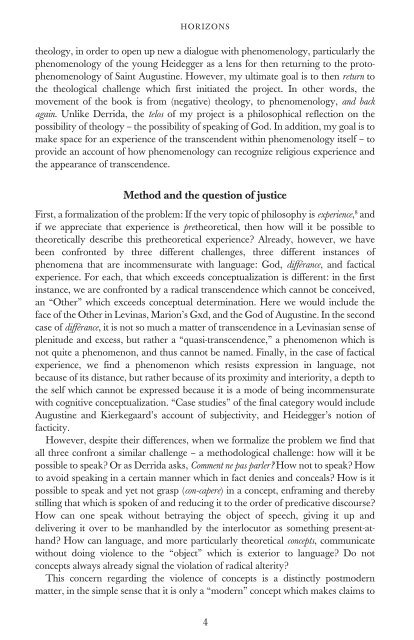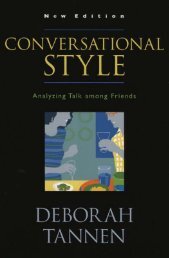Speech and Theology: Language and the Logic of Incarnation
Speech and Theology: Language and the Logic of Incarnation
Speech and Theology: Language and the Logic of Incarnation
Create successful ePaper yourself
Turn your PDF publications into a flip-book with our unique Google optimized e-Paper software.
HORIZONS<br />
<strong>the</strong>ology, in order to open up new a dialogue with phenomenology, particularly <strong>the</strong><br />
phenomenology <strong>of</strong> <strong>the</strong> young Heidegger as a lens for <strong>the</strong>n returning to <strong>the</strong> protophenomenology<br />
<strong>of</strong> Saint Augustine. However, my ultimate goal is to <strong>the</strong>n return to<br />
<strong>the</strong> <strong>the</strong>ological challenge which first initiated <strong>the</strong> project. In o<strong>the</strong>r words, <strong>the</strong><br />
movement <strong>of</strong> <strong>the</strong> book is from (negative) <strong>the</strong>ology, to phenomenology, <strong>and</strong> back<br />
again. Unlike Derrida, <strong>the</strong> telos <strong>of</strong> my project is a philosophical reflection on <strong>the</strong><br />
possibility <strong>of</strong> <strong>the</strong>ology – <strong>the</strong> possibility <strong>of</strong> speaking <strong>of</strong> God. In addition, my goal is to<br />
make space for an experience <strong>of</strong> <strong>the</strong> transcendent within phenomenology itself – to<br />
provide an account <strong>of</strong> how phenomenology can recognize religious experience <strong>and</strong><br />
<strong>the</strong> appearance <strong>of</strong> transcendence.<br />
Method <strong>and</strong> <strong>the</strong> question <strong>of</strong> justice<br />
First, a formalization <strong>of</strong> <strong>the</strong> problem: If <strong>the</strong> very topic <strong>of</strong> philosophy is experience, 8 <strong>and</strong><br />
if we appreciate that experience is pre<strong>the</strong>oretical, <strong>the</strong>n how will it be possible to<br />
<strong>the</strong>oretically describe this pre<strong>the</strong>oretical experience? Already, however, we have<br />
been confronted by three different challenges, three different instances <strong>of</strong><br />
phenomena that are incommensurate with language: God, différance, <strong>and</strong> factical<br />
experience. For each, that which exceeds conceptualization is different: in <strong>the</strong> first<br />
instance, we are confronted by a radical transcendence which cannot be conceived,<br />
an “O<strong>the</strong>r” which exceeds conceptual determination. Here we would include <strong>the</strong><br />
face <strong>of</strong> <strong>the</strong> O<strong>the</strong>r in Levinas, Marion’s Gxd, <strong>and</strong> <strong>the</strong> God <strong>of</strong> Augustine. In <strong>the</strong> second<br />
case <strong>of</strong> différance, it is not so much a matter <strong>of</strong> transcendence in a Levinasian sense <strong>of</strong><br />
plenitude <strong>and</strong> excess, but ra<strong>the</strong>r a “quasi-transcendence,” a phenomenon which is<br />
not quite a phenomenon, <strong>and</strong> thus cannot be named. Finally, in <strong>the</strong> case <strong>of</strong> factical<br />
experience, we find a phenomenon which resists expression in language, not<br />
because <strong>of</strong> its distance, but ra<strong>the</strong>r because <strong>of</strong> its proximity <strong>and</strong> interiority, a depth to<br />
<strong>the</strong> self which cannot be expressed because it is a mode <strong>of</strong> being incommensurate<br />
with cognitive conceptualization. “Case studies” <strong>of</strong> <strong>the</strong> final category would include<br />
Augustine <strong>and</strong> Kierkegaard’s account <strong>of</strong> subjectivity, <strong>and</strong> Heidegger’s notion <strong>of</strong><br />
facticity.<br />
However, despite <strong>the</strong>ir differences, when we formalize <strong>the</strong> problem we find that<br />
all three confront a similar challenge – a methodological challenge: how will it be<br />
possible to speak? Or as Derrida asks, Comment ne pas parler? How not to speak? How<br />
to avoid speaking in a certain manner which in fact denies <strong>and</strong> conceals? How is it<br />
possible to speak <strong>and</strong> yet not grasp (con-capere) in a concept, enframing <strong>and</strong> <strong>the</strong>reby<br />
stilling that which is spoken <strong>of</strong> <strong>and</strong> reducing it to <strong>the</strong> order <strong>of</strong> predicative discourse?<br />
How can one speak without betraying <strong>the</strong> object <strong>of</strong> speech, giving it up <strong>and</strong><br />
delivering it over to be manh<strong>and</strong>led by <strong>the</strong> interlocutor as something present-ath<strong>and</strong>?<br />
How can language, <strong>and</strong> more particularly <strong>the</strong>oretical concepts, communicate<br />
without doing violence to <strong>the</strong> “object” which is exterior to language? Do not<br />
concepts always already signal <strong>the</strong> violation <strong>of</strong> radical alterity?<br />
This concern regarding <strong>the</strong> violence <strong>of</strong> concepts is a distinctly postmodern<br />
matter, in <strong>the</strong> simple sense that it is only a “modern” concept which makes claims to<br />
4



